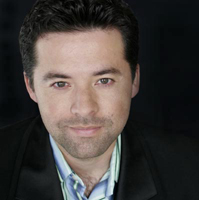El Salvador Mirrors the Middle East
How 9/11 Prompted Oscar Torres to Write a Film About Growing Up in War-torn Central America

The impact of the World Trade Center attacks in 2001 – so mercilessly beaten into our political mindset – has only slowly made it into our artistic and cultural consciousness. While the icon of September 11 has brought us absurd theater, like President Bush’s fighter pilot performance on an aircraft carrier signaling the end of the Iraq war nearly 3,000 American soldier deaths ago, it’s mostly been interpreted in terms of fear and anxiety. The TV show 24 is the most popular of the “fear art” that was spawned by 9/11.
But subtle influences can be discerned in an increasing number of venues, some seemingly disconnected entirely from the attacks themselves. Take Voces Inocentes (“Innocent Voices”), a Spanish language film that first aired two years ago at the Santa Barbara International Film Festival. Based on an autobiographical tale of a child’s life in war-torn El Salvador, its artistic and intellectual roots are firmly in September 11.

Screenwriter Oscar Torres was at UCSB last month as a guest of the Chicano Studies Department, which screened Voces Inocentes on May 22. Torres introduced his film and later, in a professor’s office, he described how the World Trade Center attacks shaped his poignant and emotional tale of children being pulled into wars that their parents have spawned. The writing of the film was “triggered by September 11,” said Torres, who also cautioned that the lessons of his story may be repeated as the U.S. tries to find an exit strategy from our failed war in Iraq.
In the early 1980s, Torres lived in the outskirts of San Salvador in a barrio named Cuscatancingo, adjacent to the guerilla controlled Chalatenango province. It was the height of the civil war when civilian casualties were their highest. By day, Salvadoran army patrols would enter his neighborhood and conscript young boys into the army. By night, the guerillas would come and do the same. For Torres and his generation of pre-teens, life was about clinging to boyhood while avoiding the ever-bloodier war.
After fleeing El Salvador in 1985 at the age of 14, Torres came to Los Angeles, lived with an uncle, and attended school where he was again pulled in two directions, first by school, then by the Salvadoran gangs that were gaining a foothold in east Los Angeles. “My life was so dark,” he recalled. “I suffered from a series of panic attacks.” They hit him with such frequency after his traumatic Salvadoran upbringing and chaotic American life that, at times, he thought he “was dying.”
He persevered, avoiding the gangs, and was accepted at UC Berkeley. But he dropped out after watching Cinema Paradiso, deciding he wanted a career in the movies instead. He moved back to Los Angeles, and started working in various Hollywood jobs.
After watching the fall of the Twin Towers, he was provoked to sit down and write out the trauma of his own childhood – the sudden death, the war, and the sense of loss. “When I sat down to write, I started to feel better,” Torres explained. “I had opened up something else. I kept digging and kept exploring.”
In 2002, on the set of a TV commercial where Torres had a bit part, he approached director Luis Mandoki (When A Man Loves A Woman, Message In A Bottle) with his idea. Mandoki urged him on and enlisted producer Lawrence Bender (Good Will Hunting) to join the production.
A few short years later, Voces Inocentes went on to win a number of film festival awards. It opened to huge crowds in El Salvador three years ago and produced a sharp critique from the government, which asserted the film was divisive. Torres responded, “I discovered that for 13 years people had not talked about the war.” The government had made debate and discussion of the war “taboo.”
But as the movie was shown and widely pirated across El Salvador, “It was like people who had not taken a breath for years. And when they started coughing [after watching this movie] from a lack of breath, they suddenly began talking.” While writing the movie was a catharsis for Torres, he feels it was an even greater catharsis for El Salvador.
Last month at UCSB, the movie was part of a Chicano Studies Department event focusing attention on the U.S. involvement in the Salvadoran war, specifically the role played by Salvadoran soldiers trained at Fort Benning, Georgia’s School of the Americas, which was recently renamed the Western Hemisphere Institute for Security Cooperation. Torres said the movie was not intended to give America any lessons about their role in El Salvador. But it is a reminder that “a war doesn’t end when it ends.”

In El Salvador, the war ended and the worst elements of the military and security apparatus were cashiered and left unemployed. The result, said Torres, was the growth of Salvadoran gangs both in the U.S. and El Salvador, originally filled with ex-soldiers who were experts at kidnapping and killing. These gangs have grown, not only in the Los Angeles where the Mara Salvatrucha 13 was born, but across the U.S. They are increasingly more violent with Newsweek earlier this year labeling MS-13 as the most dangerous gang in America. Their violence has spread back into El Salvador as U.S. authorities deport gang members back to their home country, where law enforcement has been ill equipped to fight their growing influence.
In Iraq, the U.S. appears to have made the same mistake, cashiering Saddam Hussein’s Iraqi army only to have it become the lifeblood of the insurgency. More important, if and when the U.S. leaves Iraq, as it did El Salvador, Torres advises, “We need to take care of the people that are left behind. The people that have their homes bombed out and no jobs.” Otherwise, Torres warned, “It will catch up with us just like it has in El Salvador.”
411
For more on Voces Inocentes, see innocentvoicesmovie.com. For more on the School of the Americas’s legacy, see soaw.org.



